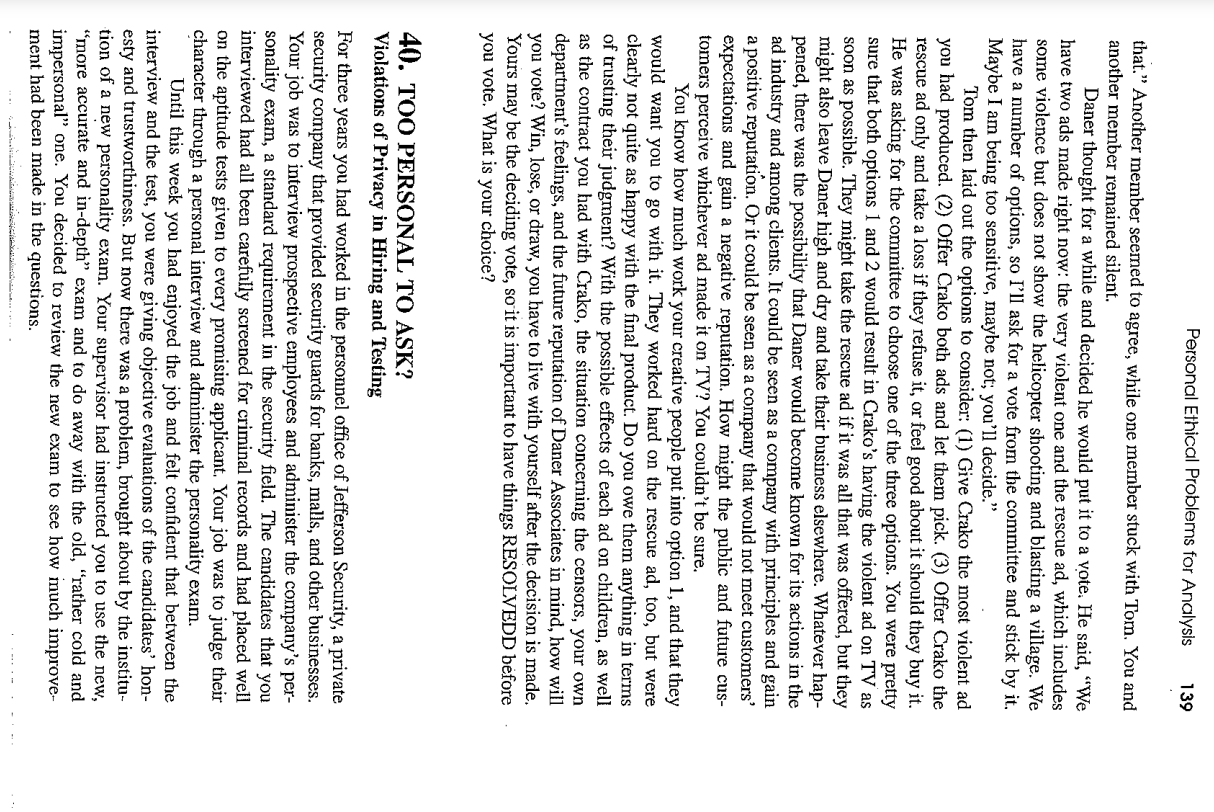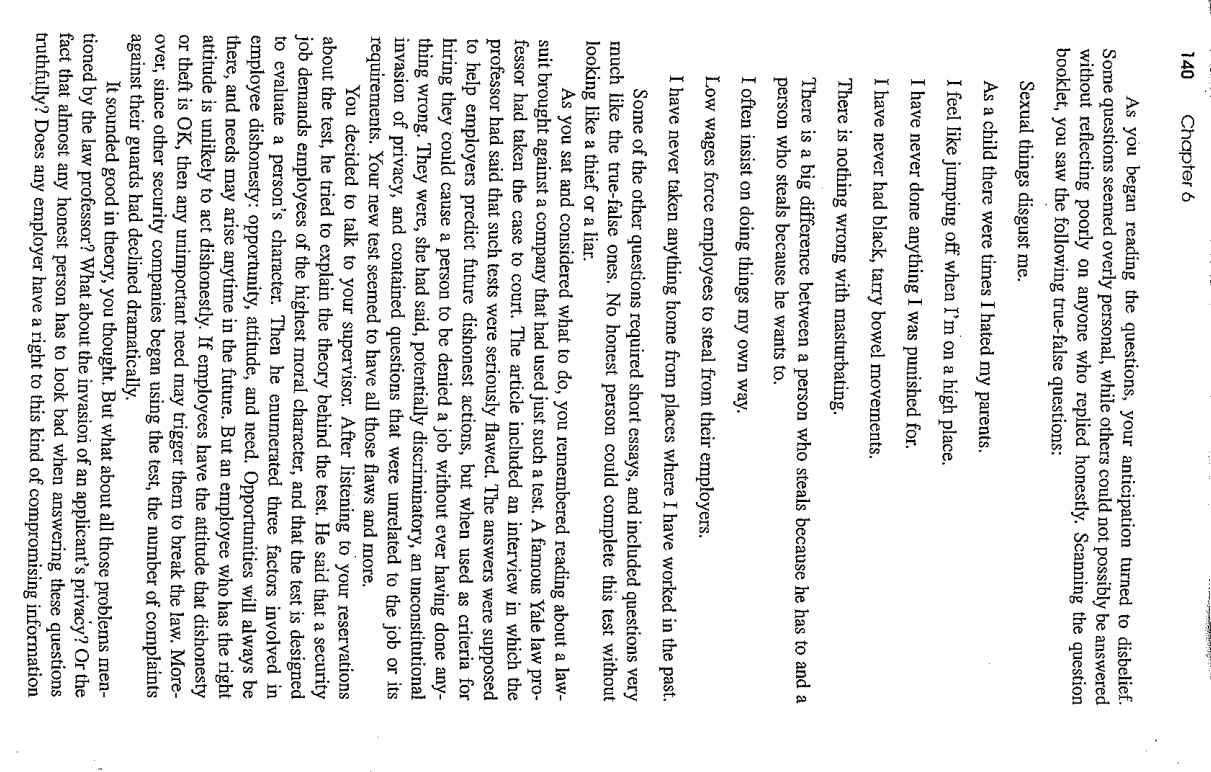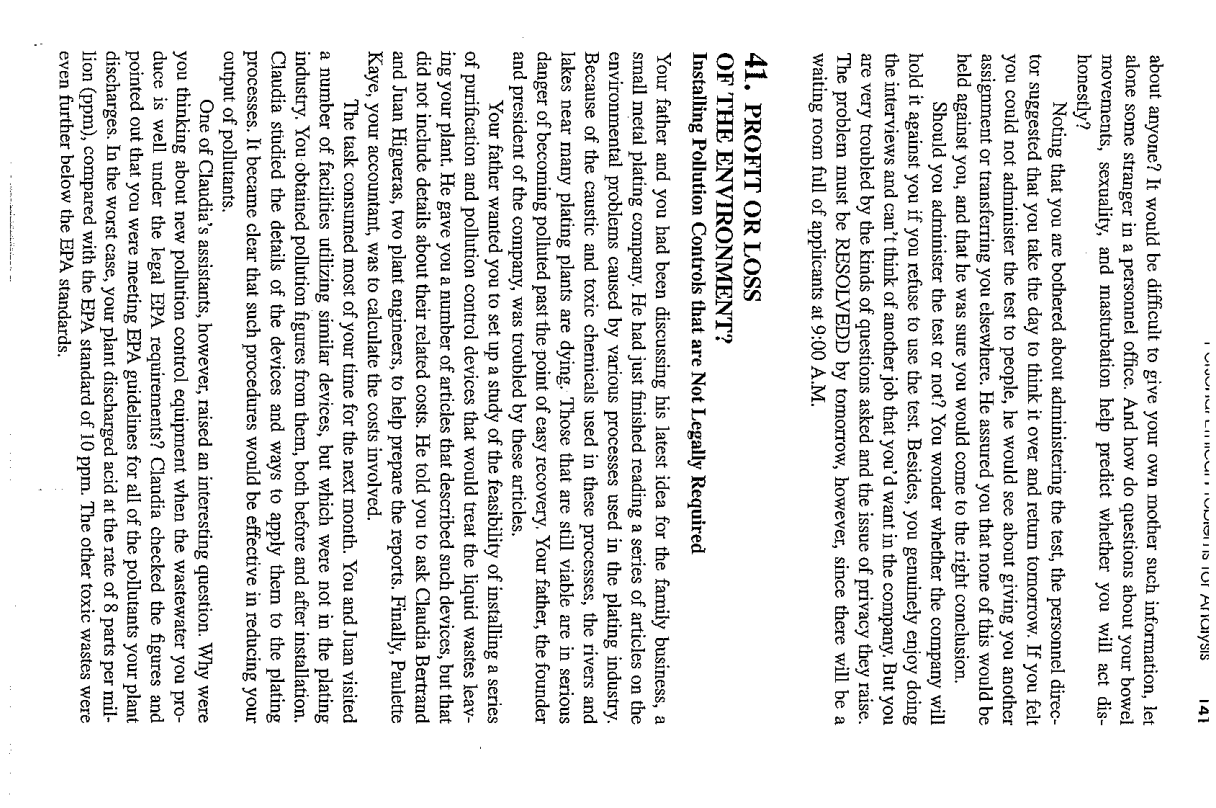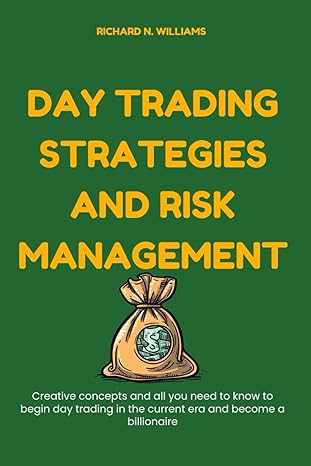Question
I want you to apply the RESOLVEDD strategy to the case titled Too Personal to Ask? Tips on writing an analysis: 1. Write the individual
I want you to apply the RESOLVEDD strategy to the case titled Too Personal to Ask?
Tips on writing an analysis: 1. Write the individual and group analyses in the first-person. 2. Dont use bullet points. 3. Model your analysis on the Gatsby case as its laid out in chapter 3. Use the check list at the end of chapter three. Also, there are some tips from the authors at the end of chapter 4. 4. More relevant details in steps 4, 5, and 6. 5. With most cases, step 7 will be the longest. Read the two sections in chapter 4 on evaluation. This is not just a summary of what you covered in the previous steps. With step 7, were using a different sort of language. 6. Dont forget about the importance of the last step, defense.


 that." Another member seemed to agree, while one member stuck with Tom. You and another member remained silent. Daner thought for a while and decided he would put it to a vote. He said, "We have two ads made right now: the very violent one and the rescue ad, which includes some violence but does not show the helicopter shooting and blasting a village. We have a number of options, so I'll ask for a vote from the committee and stick by it. Maybe I am being too sensitive, maybe not; you'll decide." Tom then laid out the options to consider: (1) Give Crako the most violent ad you had produced. (2) Offer Crako both ads and let them pick. (3) Offer Crako the rescue ad only and take a loss if they refuse it, or feel good about it should they buy it. He was asking for the committee to choose one of the three options. You were pretty sure that both options 1 and 2 would result in Crako's having the violent ad on TV as soon as possible. They might take the rescue ad if it was all that was offered, but they might also leave Daner high and dry and take their business elsewhere. Whatever happened, there was the possibility that Daner would become known for its actions in the ad industry and among clients. It could be seen as a company with principles and gain a positive reputation. Or it could be seen as a company that would not meet customers' expectations and gain a negative reputation. How might the public and future customers perceive whichever ad made it on TV? You couldn't be sure. You know how much work your creative people put into option 1, and that they would want you to go with it. They worked hard on the rescue ad, too, but were clearly not quite as happy with the final product. Do you owe them anything in terms of trusting their judgment? With the possible effects of each ad on children, as well as the contract you had with Crako, the situation concerning the censors, your own department's feelings, and the future reputation of Daner Associates in mind, how will you vote? Win, lose, or draw, you have to live with yourself after the decision is made. Yours may be the deciding vote, so it is important to have things RESOLVEDD before you vote. What is your choice? 40. TOO PERSONAL TO ASK? Violations of Privacy in Hiring and Testing For three years you had worked in the personnel office of Jefferson Security, a private security company that provided security guards for banks, malls, and other businesses. Your job was to interview prospective employees and administer the company's personality exam, a standard requirement in the security field. The candidates that you interviewed had all been carefully screened for criminal records and had placed well on the aptitude tests given to every promising applicant. Your job was to judge their character through a personal interview and administer the personality exam. Until this week you had enjoyed the job and felt confident that between the interview and the test, you were giving objective evaluations of the candidates' honesty and trustworthiness. But now there was a problem, brought about by the institution of a new personality exam. Your supervisor had instructed you to use the new, "more accurate and in-depth" exam and to do away with the old, "rather cold and impersonal" one. You decided to review the new exam to see how much improvement had been made in the questions. 140 Chapter 6 As you began reading the questions, your anticipation turned to disbelief. Some questions seemed overly personal, while others could not possibly be answered without reflecting poorly on anyone who replied honestly. Scanning the question booklet, you saw the following true-false questions: Sexual things disgust me. As a child there were times I hated my parents. I feel like jumping off when I'm on a high place. I have never done anything I was punished for. I have never had black, tarry bowel movements. There is nothing wrong with masturbating. There is a big difference between a person who steals because he has to and a person who steals because he wants to. I often insist on doing things my own way. Low wages force employees to steal from their employers. I have never taken anything home from places where I have worked in the past. Some of the other questions required short essays, and included questions very much like the true-false ones. No honest person could complete this test without looking like a thief or a liar. As you sat and considered what to do, you remembered reading about a lawsuit brought against a company that had used just such a test. A famous Yale law professor had taken the case to court. The article included an interview in which the professor had said that such tests were seriously flawed. The answers were supposed to help employers predict future dishonest actions, but when used as criteria for hiring they could cause a person to be denied a job without ever having done anything wrong. They were, she had said, potentially discriminatory, an unconstitutional invasion of privacy, and contained questions that were unrelated to the job or its requirements. Your new test seemed to have all those flaws and more. You decided to talk to your supervisor. After listening to your reservations about the test, he tried to explain the theory behind the test. He said that a security job demands employees of the highest moral character, and that the test is designed to evaluate a person's character. Then he enumerated three factors involved in employee dishonesty: opportunity, attitude, and need. Opportunities will always be there, and needs may arise anytime in the future. But an employee who has the right attitude is unlikely to act dishonestly. If employees have the attitude that dishonesty or theft is OK, then any unimportant need may trigger them to break the law. Moreover, since other security companies began using the test, the number of complaints against their guards had declined dramatically. It sounded good in theory, you thought. But what about all those problems mentioned by the law professor? What about the invasion of an applicant's privacy? Or the fact that almost any honest person has to look bad when answering these questions truthfully? Does any employer have a right to this kind of compromising information about anyone? It would be difficult to give your own mother such information, let alone some stranger in a personnel office. And how do questions about your bowel movements, sexuality, and masturbation help predict whether you will act dishonestly? Noting that you are bothered about administering the test, the personnel director suggested that you take the day to think it over and return tomorrow. If you felt you could not administer the test to people, he would see about giving you another assignment or transferring you elsewhere. He assured you that none of this would be held against you, and that he was sure you would come to the right conclusion. Should you administer the test or not? You wonder whether the company will hold it against you if you refuse to use the test. Besides, you genuinely enjoy doing the interviews and can't think of another job that you'd want in the company. But you are very troubled by the kinds of questions asked and the issue of privacy they raise. The problem must be RESOLVEDD by tomorrow, however, since there will be a waiting room full of applicants at 9:00 A.M. 41. PROFIT OR LOSS OF THE ENVIRONMENT? Installing Pollution Controls that are Not Legally Required Your father and you had been discussing his latest idea for the family business, a small metal plating company. He had just finished reading a series of articles on the environmental problems caused by various processes used in the plating industry. Because of the caustic and toxic chemicals used in these processes, the rivers and lakes near many plating plants are dying. Those that are still viable are in serious danger of becoming polluted past the point of easy recovery. Your father, the founder and president of the company, was troubled by these articles. Your father wanted you to set up a study of the feasibility of installing a series of purification and pollution control devices that would treat the liquid wastes leaving your plant. He gave you a number of articles that described such devices, but that did not include details about their related costs. He told you to ask Claudia Bertrand and Juan Higueras, two plant engineers, to help prepare the reports. Finally, Paulette Kaye, your accountant, was to calculate the costs involved. The task consumed most of your time for the next month. You and Juan visited a number of facilities utilizing similar devices, but which were not in the plating industry. You obtained pollution figures from them, both before and after installation. Claudia stidied the details of the devices and ways to apply them to the plating processes. It became clear that such procedures would be effective in reducing your output of pollutants. One of Claudia's assistants, however, raised an interesting question. Why were you thinking about new pollution control equipment when the wastewater you produce is well under the legal EPA requirements? Claudia checked the figures and pointed out that you were meeting EPA guidelines for all of the pollutants your plant discharges. In the worst case, your plant discharged acid at the rate of 8 parts per million (ppm), compared with the EPA standard of 10ppm. The other toxic wastes were even further below the EPA standards
that." Another member seemed to agree, while one member stuck with Tom. You and another member remained silent. Daner thought for a while and decided he would put it to a vote. He said, "We have two ads made right now: the very violent one and the rescue ad, which includes some violence but does not show the helicopter shooting and blasting a village. We have a number of options, so I'll ask for a vote from the committee and stick by it. Maybe I am being too sensitive, maybe not; you'll decide." Tom then laid out the options to consider: (1) Give Crako the most violent ad you had produced. (2) Offer Crako both ads and let them pick. (3) Offer Crako the rescue ad only and take a loss if they refuse it, or feel good about it should they buy it. He was asking for the committee to choose one of the three options. You were pretty sure that both options 1 and 2 would result in Crako's having the violent ad on TV as soon as possible. They might take the rescue ad if it was all that was offered, but they might also leave Daner high and dry and take their business elsewhere. Whatever happened, there was the possibility that Daner would become known for its actions in the ad industry and among clients. It could be seen as a company with principles and gain a positive reputation. Or it could be seen as a company that would not meet customers' expectations and gain a negative reputation. How might the public and future customers perceive whichever ad made it on TV? You couldn't be sure. You know how much work your creative people put into option 1, and that they would want you to go with it. They worked hard on the rescue ad, too, but were clearly not quite as happy with the final product. Do you owe them anything in terms of trusting their judgment? With the possible effects of each ad on children, as well as the contract you had with Crako, the situation concerning the censors, your own department's feelings, and the future reputation of Daner Associates in mind, how will you vote? Win, lose, or draw, you have to live with yourself after the decision is made. Yours may be the deciding vote, so it is important to have things RESOLVEDD before you vote. What is your choice? 40. TOO PERSONAL TO ASK? Violations of Privacy in Hiring and Testing For three years you had worked in the personnel office of Jefferson Security, a private security company that provided security guards for banks, malls, and other businesses. Your job was to interview prospective employees and administer the company's personality exam, a standard requirement in the security field. The candidates that you interviewed had all been carefully screened for criminal records and had placed well on the aptitude tests given to every promising applicant. Your job was to judge their character through a personal interview and administer the personality exam. Until this week you had enjoyed the job and felt confident that between the interview and the test, you were giving objective evaluations of the candidates' honesty and trustworthiness. But now there was a problem, brought about by the institution of a new personality exam. Your supervisor had instructed you to use the new, "more accurate and in-depth" exam and to do away with the old, "rather cold and impersonal" one. You decided to review the new exam to see how much improvement had been made in the questions. 140 Chapter 6 As you began reading the questions, your anticipation turned to disbelief. Some questions seemed overly personal, while others could not possibly be answered without reflecting poorly on anyone who replied honestly. Scanning the question booklet, you saw the following true-false questions: Sexual things disgust me. As a child there were times I hated my parents. I feel like jumping off when I'm on a high place. I have never done anything I was punished for. I have never had black, tarry bowel movements. There is nothing wrong with masturbating. There is a big difference between a person who steals because he has to and a person who steals because he wants to. I often insist on doing things my own way. Low wages force employees to steal from their employers. I have never taken anything home from places where I have worked in the past. Some of the other questions required short essays, and included questions very much like the true-false ones. No honest person could complete this test without looking like a thief or a liar. As you sat and considered what to do, you remembered reading about a lawsuit brought against a company that had used just such a test. A famous Yale law professor had taken the case to court. The article included an interview in which the professor had said that such tests were seriously flawed. The answers were supposed to help employers predict future dishonest actions, but when used as criteria for hiring they could cause a person to be denied a job without ever having done anything wrong. They were, she had said, potentially discriminatory, an unconstitutional invasion of privacy, and contained questions that were unrelated to the job or its requirements. Your new test seemed to have all those flaws and more. You decided to talk to your supervisor. After listening to your reservations about the test, he tried to explain the theory behind the test. He said that a security job demands employees of the highest moral character, and that the test is designed to evaluate a person's character. Then he enumerated three factors involved in employee dishonesty: opportunity, attitude, and need. Opportunities will always be there, and needs may arise anytime in the future. But an employee who has the right attitude is unlikely to act dishonestly. If employees have the attitude that dishonesty or theft is OK, then any unimportant need may trigger them to break the law. Moreover, since other security companies began using the test, the number of complaints against their guards had declined dramatically. It sounded good in theory, you thought. But what about all those problems mentioned by the law professor? What about the invasion of an applicant's privacy? Or the fact that almost any honest person has to look bad when answering these questions truthfully? Does any employer have a right to this kind of compromising information about anyone? It would be difficult to give your own mother such information, let alone some stranger in a personnel office. And how do questions about your bowel movements, sexuality, and masturbation help predict whether you will act dishonestly? Noting that you are bothered about administering the test, the personnel director suggested that you take the day to think it over and return tomorrow. If you felt you could not administer the test to people, he would see about giving you another assignment or transferring you elsewhere. He assured you that none of this would be held against you, and that he was sure you would come to the right conclusion. Should you administer the test or not? You wonder whether the company will hold it against you if you refuse to use the test. Besides, you genuinely enjoy doing the interviews and can't think of another job that you'd want in the company. But you are very troubled by the kinds of questions asked and the issue of privacy they raise. The problem must be RESOLVEDD by tomorrow, however, since there will be a waiting room full of applicants at 9:00 A.M. 41. PROFIT OR LOSS OF THE ENVIRONMENT? Installing Pollution Controls that are Not Legally Required Your father and you had been discussing his latest idea for the family business, a small metal plating company. He had just finished reading a series of articles on the environmental problems caused by various processes used in the plating industry. Because of the caustic and toxic chemicals used in these processes, the rivers and lakes near many plating plants are dying. Those that are still viable are in serious danger of becoming polluted past the point of easy recovery. Your father, the founder and president of the company, was troubled by these articles. Your father wanted you to set up a study of the feasibility of installing a series of purification and pollution control devices that would treat the liquid wastes leaving your plant. He gave you a number of articles that described such devices, but that did not include details about their related costs. He told you to ask Claudia Bertrand and Juan Higueras, two plant engineers, to help prepare the reports. Finally, Paulette Kaye, your accountant, was to calculate the costs involved. The task consumed most of your time for the next month. You and Juan visited a number of facilities utilizing similar devices, but which were not in the plating industry. You obtained pollution figures from them, both before and after installation. Claudia stidied the details of the devices and ways to apply them to the plating processes. It became clear that such procedures would be effective in reducing your output of pollutants. One of Claudia's assistants, however, raised an interesting question. Why were you thinking about new pollution control equipment when the wastewater you produce is well under the legal EPA requirements? Claudia checked the figures and pointed out that you were meeting EPA guidelines for all of the pollutants your plant discharges. In the worst case, your plant discharged acid at the rate of 8 parts per million (ppm), compared with the EPA standard of 10ppm. The other toxic wastes were even further below the EPA standards Step by Step Solution
There are 3 Steps involved in it
Step: 1

Get Instant Access to Expert-Tailored Solutions
See step-by-step solutions with expert insights and AI powered tools for academic success
Step: 2

Step: 3

Ace Your Homework with AI
Get the answers you need in no time with our AI-driven, step-by-step assistance
Get Started


